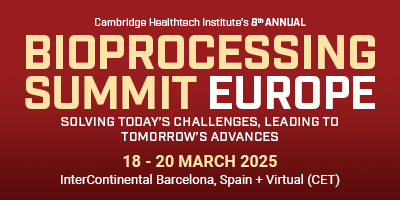Cambridge Healthtech Instituteの初開催
Next-Generation Analytical Methods
次世代の分析法
New Technologies for Characterization and Formulation of Complex Biotherapeutics
複合的なバイオ医薬品の特性評価や製剤の新技術
2025年3月19日 - 20日 CET(中央ヨーロッパ標準時)
3月19日(水)
10:30Registration Open
PLENARY KEYNOTE: ADAPTING TO GLOBAL DEMANDS AND EVOLVING PIPELINES
プレナリー基調講演:世界的な需要への適応と進化するパイプライン
CMC Strategies for Diverse Pipelines and Complex Modalities
 Christian Hunzinger, PhD, Senior Director and Head, CMC Development Proteins, ADCs and Chemical Entities, BioNTech
Christian Hunzinger, PhD, Senior Director and Head, CMC Development Proteins, ADCs and Chemical Entities, BioNTech
Biopharmaceutical treatment paradigms are shifting from monotherapy towards multi-target approaches with complex multimodal entities. This complexity also translates into increasingly complex CMC development and manufacturing strategies. The talk will provide a general overview on recent developments, challenges, and opportunities, along with examples from various stages of the CMC development lifecycle.
Enhancing Process Development: Balancing Yields with Downstream Efficiency and Emerging Technologies
 Oliver Kaltenbrunner, PhD, Scientific Director, Process Development, Amgen Inc.
Oliver Kaltenbrunner, PhD, Scientific Director, Process Development, Amgen Inc.
Explore the evolving landscape of process development, emphasising the critical balance between maximising yields and optimising downstream processing. This presentation will delve into the impact of upstream processes on primary recovery, integrating cutting-edge technologies like Process Analytical Technology (PAT), advanced modelling, and artificial intelligence. Supported by real-world examples, we'll examine how these innovations are reshaping process efficiency and performance in the industry.
12:20Session Break
12:30Sponsored Presentation (Opportunity Available)
13:00Networking Lunch in the Exhibit Hall with Poster Viewing

NEW MS APPLICATIONS AND TECHNOLOGIES
新たなMSアプリケーションとテクノロジー
Process Analytics Using an Integrated Autonomous System
 Jonathan Bones, PhD, Principal Investigator, Characterisation and Comparability Laboratory, National Institute for Bioprocessing Research and Training (NIBRT)
Jonathan Bones, PhD, Principal Investigator, Characterisation and Comparability Laboratory, National Institute for Bioprocessing Research and Training (NIBRT)
Development and application of an integrated autonomous system for process analytical monitoring of upstream processes producing monoclonal antibodies will be described. Our platform uses automated aseptic sampling and distribution to analytical destinations, including integrated LC-MS for near real-time product quality assessment. Supporting at-line analytics using various MS analyses were also performed for deeper process characterisation. Application for optimisation of mAb galactosylation using a design of experiments approach will be discussed.
Expanding the LCMS Toolbox for HCP Analytics: Use of Activity-Based Protein Profiling for Identification of Active Polysorbate/Protein Degrading Enzymes
 Veronika Reisinger, PhD, Lab Head, Physico Chemical Characterization, Novartis AG
Veronika Reisinger, PhD, Lab Head, Physico Chemical Characterization, Novartis AG
Residual host cell proteins (HCPs) can impact patient safety and/or product quality. As the standard ELISA methods are usually not capable of identifying/quantifying single HCPs, LCMS-based methods were established as orthogonal methods over the recent years. But neither the current ELISA nor LCMS methods can selectively identify enzymatically active HCPs (e.g., polysorbate or protein degrading enzymes). Methods combining the enrichment of enzymatically active HCPs and their identification can close this gap. Here, we present a combination of activity-based protein profiling and LCMS analysis, enabling the set-up of targeted MS-based methods to support process development in a subsequent step.
KEYNOTE PRESENTATION: Merging Automatic Peak Fractionation with a Multitude of MS Workflows-In-Depth Characterisation of ADCs & Other Complex Formats
 Dan Bach Kristensen, PhD, Scientific Director, Symphogen
Dan Bach Kristensen, PhD, Scientific Director, Symphogen
During biopharmaceutical development, product quality is monitored by a range of impurity methods, including liquid chromatography (LC) methods such as size-exclusion chromatography (SEC), reversed-phase chromatography (RPC), and ion-exchange chromatography (IEX). Simultaneously, mass spectrometry is a well-established and essential analytical tool for characterisation of biopharmaceutical product impurities. Here, we present the merger of automated peak fractionation of any type of LC method with any type of MS characterisation, including intact mass analysis and peptide mapping by LC MS. Case studies will include MS characterisation of biopharmaceutical product variants, including ADCs and other complex formats, separated by SEC, CIEX, and RPC.
Enabling Broader Adoption of MAM: Comparison of MAM vs. Conventional Methods
 Diane McCarthy, PhD, Senior Scientific Director, Global Biologics, US Pharmacopeia
Diane McCarthy, PhD, Senior Scientific Director, Global Biologics, US Pharmacopeia
While the multi-attribute method (MAM) has potential to improve the efficiency and specificity of analytical testing, comparison to conventional methods is critical for implementation in QC. Through a cooperative agreement with US FDA, we have evaluated the performance of MAM versus conventional methods in detecting differences between thermally degraded therapeutic proteins from multiple sources. This presentation will share results and an implementation roadmap to facilitate broader adoption of MAM.
16:20Refreshment Break in the Exhibit Hall with Poster Viewing

AI and Big Data Tools in the Analytical Function and Beyond
Angela Botros, PhD, Process Modeling Expert, DataHow AG
- Success and failure stories of AI/ML for specific methods and instruments
- Utilized software tools and maintenance of created AI solution
- Benchmark vs traditional approaches
- Opportunities and challenges
- Experimental method validation in GMP environments
- Holistic digitalization perspective beyond analytical
Interactive Breakout Discussions are informal, moderated discussions, allowing participants to exchange ideas and experiences and develop future collaborations around a focused topic. Each discussion will be led by a facilitator who keeps the discussion on track and the group engaged. To get the most out of this format, please come prepared to share examples from your work, be a part of a collective, problem-solving session, and participate in active idea sharing. Please visit the Interactive Breakout Discussions page on the conference website for a complete listing of topics and descriptions.
Developability Assessment of Biotherapeutics - A Solved Problem or an Outstanding Challenge?
Hristo Svilenov, PhD, Associate Professor, TUM
- Common developability pitfalls for novel modalities (e.g., bispecifics, ADCs)
- Strategies for mitigating aggregation, instability, and immunogenicity
- Real-world constraints in applying developability frameworks
- Evolving regulatory expectations for developability data
18:30Close of Day
3月20日(木)
08:00Registration and Morning Coffee
ANALYTICAL METHODS FOR FORMULATION DEVELOPMENT
製剤開発向け分析法
FEATURED PRESENTATION: Developability Assessment of Antibodies with a Focus on Interfacial Stability
 Hristo Svilenov, PhD, Associate Professor, TUM
Hristo Svilenov, PhD, Associate Professor, TUM
Adsorption and aggregation of antibodies at interfaces presents a risk for developing antibody drug candidates. However, it is difficult to predict this molecule behaviour from the physicochemical properties of the antibodies. In this presentation, I will show our latest work on the developability assessment of antibody drug candidates with a focus on predicting protein adsorption and aggregation induced by interfaces.
Quantitatively Characterise Polysorbate 80 Oxidation to Establish Placebo Product Shelf-Life Consideration
 Sisi Zhang, Principal Scientist, Regeneron Pharmaceuticals, Inc.
Sisi Zhang, Principal Scientist, Regeneron Pharmaceuticals, Inc.
A PS80-oxidised product had been discovered and validated to reveal early signs of PS80 oxidation and quantitively describe the status of PS80 oxidation regardless of the stress condition and incubation time. The accuracy and precision of this PS80 oxidation marker measurement agreed with industry guidelines and therefore can be used to indicate the status of PS80 oxidation and applied to establish the shelf-life to the potential for PS stability.
Considerations for Viral Vector Stability in Manufacturing
 Angeles Mecate Zambrano, Senior Scientist, Viral Gene Therapy, Merck KGaA
Angeles Mecate Zambrano, Senior Scientist, Viral Gene Therapy, Merck KGaA
Viral gene therapy holds great promise for treating complex diseases, but its success depends on producing high-quality viral vectors. Manufacturing these vectors presents challenges, particularly in optimising yield and stability. Here, we delve into physiochemical process conditions that affect AAV particle stability and aggregation, and we provide insights into how additives can improve particle stability and resistance to critical manufacturing process conditions.
10:00Attend Parallel Presentation
10:30Coffee Break in the Exhibit Hall with Poster Viewing

Nature's Blueprint for Better Drugs: Bioinspired Drug Design and Formulation Strategies
 Iris Batalha, PhD, Associate Professor, Pharmaceutics and Drug Delivery, Life Sciences, University of Bath
Iris Batalha, PhD, Associate Professor, Pharmaceutics and Drug Delivery, Life Sciences, University of Bath
Many drugs, particularly novel modalities, face significant formulation and delivery challenges, such as stability, unwanted immunogenicity, and poor biodistribution. By leveraging the principles and structures found in nature, bioinspired drug design and formulation strategies offer a promising approach to address these issues.
EMERGING METHODS TO SUPPORT COMPLEX MODALITIES
複合的モダリティをサポートする新興メソッド
Developability Analysis and Considerations for Bispecific Antibodies
 Sean Keng Rui Chia, PhD, Associate Staff Scientist, Analytical Science & Technologies, A STAR
Sean Keng Rui Chia, PhD, Associate Staff Scientist, Analytical Science & Technologies, A STAR
Despite their therapeutic potential, bispecific antibodies present additional developability challenges compared to traditional monoclonal antibodies, due to their complex structures. Through case studies, we demonstrate how format changes can exacerbate developability issues for bispecific antibodies, such as their aggregation propensity and polyreactivity. Our findings provide new analytical approaches and perspectives to assess next-generation biologics, in the overall aim of driving their rational development.
12:10Attend Parallel Presentation
12:40Networking Lunch in the Exhibit Hall with Poster Viewing

New Mass Spectrometry Methodology to Analyse Emerging Biotherapeutics
 Thierry Besson, Principal Scientist, BRC, Novartis Pharma AG
Thierry Besson, Principal Scientist, BRC, Novartis Pharma AG
Biologics have now evolved from classical mAbs to proteins that are more difficult to analyse, such as therapeutic proteins, multispecifics, novel conjugates, siRNA-and even in the cell and gene therapy space with adeno-associated viruses, for example. With all these new modalities, state-of-the-art analytics must be developed to characterise them in detail, and MS is a major player in this area coupled with diverse liquid chromatography.
Towards Integration of SPR Measurements for at-Line Characterisation of mAb Glycosylation
 Jimmy Gaudreault, Researcher, Chemical Engineering, Polytechnique Montréal
Jimmy Gaudreault, Researcher, Chemical Engineering, Polytechnique Montréal
N-glycosylation is a critical quality attribute of monoclonal antibodies (MAbs) as it affects binding to Fcγ receptors (FcγR), which impacts the efficacy and safety of MAbs. Surface plasmon resonance (SPR) represents a promising avenue for glycosylation monitoring online of a bioreactor, as SPR biosensors can record MAb-FcγR interactions in real-time and without labelling. Using FcγRIIA/B and a low experimental temperature, we suggest a rapid quantification method for galactosylation and fucosylation.
14:30Close of Summit
* 不測の事態により、事前の予告なしにプログラムが変更される場合があります。
アジェンダ・講演者・スポンサー更新














